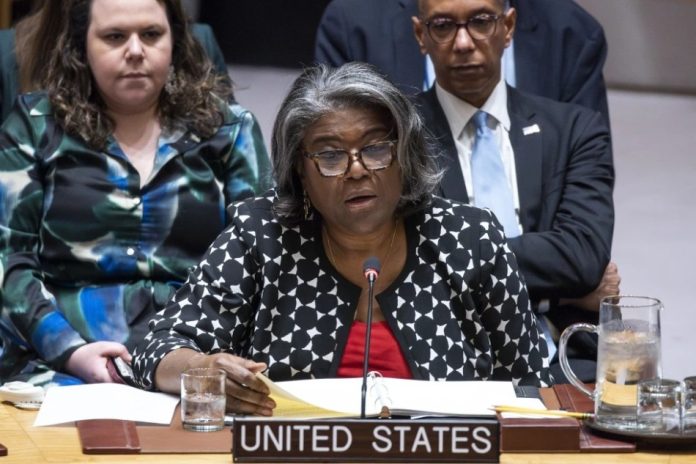The US’ Ambassador to the UN, Linda Thomas Greenfield, has announced that the US is working on a draft resolution to submit to the UN Security Council (UNSC) which will seek to support the potential ceasefire deal that US President Joe Biden announced on May 31st.
Unclear Conditions
The ceasefire, as outlined by President Biden which he’d said was proposed by Israel, would occur in three stages.
The first stage, which would last six weeks, would see a large number of hostages released, the withdrawal of Israeli forces from “populated areas of Gaza”, the release of hundreds of Palestinian prisoners held by Israel, as well as a significant expansion of humanitarian aid entering Gaza.
During this first phase, further negotiations would take place to reach phase two. Phase two, Biden said, includes the release of all remaining Israeli hostages, as well as Israel’s continued withdrawal from Gaza. Most notably, however, Biden said that phase two includes a “permanent end to hostilities.” He further reinforced this interpretation after he had finished speaking on the details of the deal.
“As long as Hamas lives up to its commitments, the temporary ceasefire would become permanent” -US President Joe Biden
Phase three is to begin the reconstruction of Gaza, and return the remains of any hostages who had died over the course of the war.
Israel has now offered a roadmap to an enduring ceasefire – and the release of all the hostages.
Yesterday, this proposal was transmitted by Qatar to Hamas.
Today, I want to lay out its terms for the world. pic.twitter.com/0cdypBP9wb
— President Biden (@POTUS) May 31, 2024
While Biden indicated that this ceasefire proposal came from Israel, Israel’s response to the announcement indicates there is still disagreement between them.
Following the announcement, Israeli Prime Minister Benjamin Netanyahu’s office stated that “Israel’s conditions for ending the war have not changed: The destruction of Hamas military and government capabilities,” as well as the release of hostages, and “ensuring that Gaza no longer poses a threat to Israel.” The PM’s office further continued stating that “under the proposal, Israel will continue to insist these conditions are met before a permanent ceasefire is put in place. The notion that Israel will agree to a permanent ceasefire before these conditions are fulfilled is a non-starter.”
In addition, Netanyahu’s office stated that “the Prime Minister authorized the negotiating team to present a proposal to that end,” in reference to the return of hostages, “which would also enable Israel to continue the war until all its objectives are achieved, including the destruction of Hamas’s military and governing capabilities.”

This response shows there is much negotiation to be done on producing a legitimate ceasefire deal, and that any ceasefire deal reached is not likely to be a permanent one, as Israel remains committed to the complete “destruction of Hamas.” Further, their response suggests that this proposal shown by Biden did not come entirely from Israel.
Israel has stated that they have agreed to a certain framework for a ceasefire deal, however given Israel’s insistence upon further negotiation on the matter, this framework seems to vary significantly from what Biden had outlined.
Biden’s statements had come as a surprise to many, as the withdrawal of IDF forces from Gaza, and a permanent ceasefire without the destruction of Hamas, had been two points that Israel had rejected in absolution in previous negotiations.
Biden’s announcement left out clear details on the fate of Hamas, as well as who would be in control of Gaza in a post-war setting. The US has insisted a reformed Palestinian Authority, who holds partial autonomy over Palestinian areas of the West Bank, should hold governance in Gaza in order to lay down the foundations for a Palestinian state. In contrast, Israel has insisted upon maintaining security in Gaza itself, with Netanyahu stating he would not replace “Hamastan with Fatahstan” (Fatah being the dominant party in the Palestinian Authority).
I am not prepared to replace "Hamastan" with "Fatahstan." pic.twitter.com/CH3V71bQGd
— Benjamin Netanyahu – ?????? ?????? (@netanyahu) May 16, 2024
Hamas released a statement following Biden’s announcement, stating that they viewed Biden’s proposal “positively,” but notably did not issue any official acceptance or denial of the ceasefire proposal.
Regardless of the lack of clarity surrounding the details of the proposal, several nations have offered their support for it. The G7 stated they “fully endorse and will stand behind the comprehensive ceasefire,” further referring to the ceasefire as “a credible pathway towards peace leading to a two-state solution.”
And now, with the US’ draft resolution to the UNSC, the proposal could see an official endorsement and support from the UN, if the resolution passes.
At the same time, Algeria, a temporary member of the UNSC, is also working on a draft resolution which will call for an immediate ceasefire, and a halt to Israel’s offensive upon the south Gaza city of Rafah.
There is no set date for when the US or Algerian resolutions will be voted upon.
Biden stated he held a phone conversation with Amir Sheikh Tamim Bin Hamad Al-Thani, the Amir of Qatar, and urged him to pressure Hamas to accept the deal. Biden has described Hamas as “the only obstacle to a complete ceasefire,” and has further called upon Hamas specifically to accept the ceasefire.
Qatar has a unique relationship with Hamas, particularly as Qatar is where Ismail Haniyeh, the political head of Hamas, resides.
Due to this relationship, Qatar has been central in hostage release and ceasefire negotiations for the entirety of the war.

